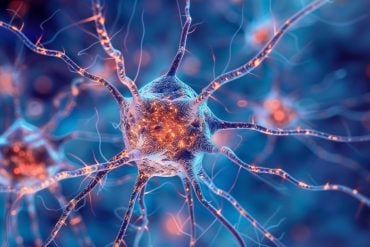Summary: Infants who experience poor sleep quality and disrupted sleep may be at increased risk of depression, anxiety, and behavioral problems as toddlers.
Source: University of Birmingham
Researchers at the Institute for Mental Health, at the University of Birmingham in collaboration with the Finnish Institute for Health and Welfare, in Helsinki, found a clear relationship between sleep problems in infancy such as frequent night wakings, short sleep duration or difficulty in falling asleep and particular emotional and behavioural problems at 24 months of age.
Although childhood sleep problems are extremely common and their association with daytime behavioural difficulties is well recognised, this study shows for the first time how sleep problems in infancy and very early childhood are associated with emotional and behavioural problems later in childhood.
The team believes these findings, published in BMJ Paediatrics Open, highlight the need to address infant sleep problems at an early stage, to prevent the development or worsening of future emotional and behavioural problems in later stages of childhood.
The team studied the results of two sleep questionnaires completed by parents within the CHILD-SLEEP birth-cohort, a large study cohort based in southern Finland. For this specific study, the researchers obtained information from nearly 1700 parents who completed a baseline questionnaire, and reported on sleep habits of their children at 3,8, 18 and 24 months. These results were compared with a separate questionnaire on emotional and behavioural symptoms, which was completed by 950 parents at the child´s age of 24 months..
The researchers found that high frequency of night wakings at 3 months was strongly linked to emotional, behavioural and self-regulation (the ability to control emotions and behaviours) problems in toddlers.Further, infants who experienced shorter sleep duration, who took longer to fall asleep and who experienced frequent night wakings at different stages of early childhood were likely to find problems in regulating their behaviour and emotions at the age of 24 months, leading to disrupting emotions and behaviours, such as temper tantrums.
The study contributes to recent research on the role of early sleep problems in socio-emotional development.

Lead researcher Dr Isabel Morales-Muñoz explained: “Our results show that infants who sleep for shorter periods of time, take longer to fall asleep and wake up more frequently during the night are more likely to show emotional and behavioural problems in later stages of childhood. It’s likely that sleep quality in these early months and the development of self-regulation – the ability to control our behaviour – are closely intertwined.”
The study suggests that infant sleep problems may be due to a variety of mechanisms, including genetic and environmental factors.
“Scientists think there are links in the central nervous system between sleep-wake behaviour and our emotions, and so it’s possible these links have a biological basis,” says Dr Morales-Muñoz. “Environmental factors, such as sleeping practices in the family, parental reactions to crying and parental stress also play an important part in a child’s sleep and socioemotional development.”
Dr Morales-Muñoz added: “Although more research needs to be done in this area, we think early interventions in infants experiencing these sleep problems could be really beneficial and help very young children develop their behavioural and emotional self-control.”
Source:
University of Birmingham
Media Contacts:
R Lockwood – University of Birmingham
Image Source:
The image is in the public domain.
Original Research: Open access
“Parent-reported early sleep problems and internalizing, externalizing, and dysregulation symptoms in toddlers”. Morales-Muñoz et al.
BMJ Paediatrics Open doi:10.1136/bmjpo-2019-000622.
Abstract
Parent-reported early sleep problems and internalizing, externalizing, and dysregulation symptoms in toddlers
Background
The concurrence of sleep and socio-emotional development in children is well accepted. However, the predictive role of sleep problems in infancy and the development of emotional and behavioural problems later in childhood remain still unclear. Therefore, in this study we examined the associations between sleep problems in early childhood and internalising, externalising and dysregulation symptoms in toddlers.
Methods
1679 families entered the study during pregnancy and 936 children participated at 24 months. Parent-reported sleep duration, sleep-onset latency, night wakings, proportion of daytime sleep and bedtime at 3, 8, 18 and 24 months were assessed with two sleep questionnaires. Externalising, internalising and dysregulation problems at 24 months were examined with the Brief Infant-Toddler Social and Emotional Assessment.
Results
Short sleep duration at 3 and 8 months, more night wakings at 3, 8, 18 and 24 months and greater proportion of daytime sleep at 24 months were associated with internalising symptoms. Shorter sleep duration at 8, 18 and 24 months and longer sleep-onset latency and more night wakings at all time points, in addition to earlier bedtime at 8 months and greater proportion of daytime sleep at 24 months, were related to dysregulation. Finally, more night wakings at 3 and 24 months, and longer sleep-onset latency at 24 months were associated with externalising problems.
Conclusion
Shorter sleep and poorer sleep quality in infancy were prospectively related to emotional and behavioural symptoms in toddlers, and these associations were strongest for internalising and dysregulation symptoms. This study contributes to the recent research on the role of early sleep problems in socio-emotional development, suggesting that shorter sleep duration, longer sleep-onset latency and higher waking frequency are related to internalising, externalising and dysregulation symptoms in toddlers, and thus it might be beneficial to provide early interventions for those infants reporting these sleep problems.






